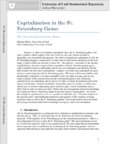|
|
Creator | Title | Description | Subject | Date |
| 1 |
 |
Mallon, Ronald | 'Race': normative, not metaphysical or semantic | In recent years, there has been a flurry of work on the metaphysics of race. While it is now widely accepted that races do not share robust, biobehavioral essences, opinions differ over what, if anything, race is. Recent work has been divided between three apparently quite different answers. A varie... | | 2006 |
| 2 |
 |
Battin, Margaret P. | A midwife through the dying process: stories of healing and hard choices at the end of life | In Timothy Quill's recounting of the deaths of nine patients, the final description is of the planned death of Jules: at home, surrounded by family members, and aided by a physician. It is a moving, true story, recounted in meticulous detail, from the first diagnosis to the final dose of barbiturat... | | 1997 |
| 3 |
 |
Francis, Leslie | A wrongful case for parental tort liability | Malek and Daar [M&D] argue that parents have a duty to employ prenatal genetic diagnosis (PGD) if they undergo IVF knowing they are at risk of transmitting a serious genetic condition. Although M&D limit their analysis to parents already undergoing PGD, in which they say the parental obligation is s... | | 2012-01-01 |
| 4 |
 |
Francis, Leslie | Accommodating every body | This Article contends that workplace accommodations should be predicated on need or effectiveness instead of group-identity status. It proposes that, in principle, "accommodating every body" be achieved by extending Americans with Disabilities Act-type reasonable accommodation to all work-capable me... | | 2014-01-01 |
| 5 |
 |
Nichols, Shaun | Adaptive complexity and phenomenal consciousness | Focuses on epiphenomenalism problems in arguments about evolutionary function of phenomenal consciousness. Implications of cognitive neuropsychology evidence for the structure of phenomenal consciousness; Distinction of different kinds of epiphenominalist arguments; Provision of a developmental basi... | Cognitive neuroscience; Cognizant; Exceptional | 2001-09-11 |
| 6 |
 |
Andreou, Chrisoula | Addiction, procrastination, and failure points in decision-making systems | Redish et al. suggest that their failures-in-decision-making framework for understanding addiction can also contribute to improving our understanding of a variety of psychiatric disorders. In the spirit of reflecting on the significance and scope of their research, I briefly develop the idea that t... | Addiction; Failure in decision-making systems | 2008-08 |
| 7 |
 |
Battin, Margaret P. | Age rationing and the just distribution of health care: is there a duty to die? | These lines express a view again stirring controversy: that the elderly who are irreversibly ill, whose lives can be continued only with substantial medical support, ought not to be given treatment; instead, their lives should be brought to an end. It should be recognized, as one contemporary politi... | | 1987 |
| 8 |
 |
Battin, Margaret P. | Age-rationing and the just distribution of health care: Is there a duty to die? | The author analyzes the argument that a policy involving distributive justice in the allocation of scarce health care resources, based on the strategy of rational self interest maximation under a veil of ignorance (Rawls/Daniels), would result in an age rationing system of voluntary, socially encour... | Health care providers; Death; Euthanasia | 1987-01 |
| 9 |
 |
Battin, Margaret P. | Aging and ethics: philosophical problems in gerontology | Aging and Ethics addresses a crucial issue: In order to address the dilemmas aging poses concerning distributive justice in health care, don't we need to rethink both the personal and social significance of old age? | | 1993 |
| 10 |
 |
Battin, Margaret P. | Applied professional ethics and institutional religion: the methodological issues | In the last several years, philosophical enthusiasm for applied professional ethics has spread from medicine to law, education, government, engineering, business, and to other professional and semiprofessional fields. Each involves an institutional structure within which professional practitioners p... | Professional ethics; Religion; Applied ethics | 1984 |
| 11 |
 |
Millgram, Elijah | Aristotle on making other selves | There is still a relative paucity of discussion of the views on friendship that Aristotle presents in the Nicomachean Ethics, although some recent work may indicate a new trend. One suspects that this paucity reflects a belief that those views are not very interesting; if true, this witnesses to an ... | Virtue-friendship; Nicomachean Ethics; Non-instrumental friendship | 1987 |
| 12 |
 |
White, Nicholas P. | Aristotle on sameness and oneness | Before I begin, let me get one substantial issue out of the way. Recently certain views which are in many ways similar to Aristotle's have been expounded in connection with the idea that there is something wrong with the words "same" and "identical" used by themselves, and that we should instead mak... | Leibniz' Law; Metaphysics; Greek philosophers | 1971-04 |
| 13 |
 |
Battin, Margaret P. | Assisted suicide: can we learn from Germany? | As the United States' public discussion of euthanasia and assisted suicide grows increasingly volatile, our interest in the Netherlands--the only country that openly permits the practice of euthanasia--has grown enormously. How do they do it? we ask. What drugs do they use? How many cases of euthan... | Assisted suicide; Netherlands; Right to die | 1992 |
| 14 |
 |
Landesman, Bruce M. | Berman, Marshall. Adventures in marxism | This book contains an introduction and thirteen short pieces previously published in such journals as the Nation, the New York Times Book Review, New Politics, and Dissent, dating from 1963 to 1998. | Capitalism; Human; System | 2001 |
| 15 |
 |
Millgram, Elijah | Book review: Candace Vogler's, John Stuart Mill's Deliberative Landscape | This is a review of Candace Vogler's John Stuart Mill's Deliberative Landscape. Vogler's explores Mill's mental breakdown and its effect on his Philosophy;. In addition, Vogler's treatment is an intervention in the contemporary debate about practical reasoning. Both in its impressive control of t... | Book review; Determinism; Moral Philosophy | 2002 |
| 16 |
 |
Battin, Margaret P. | C. G. Prado, choosing to die: elective death and multiculturalism | The central practical issue that this thorough, stimulating, and important book addresses is whether suicide can be rational in the context of terminal illness. Answers to this issue can be readily formulated in the familiar context of western political thought, with its liberal paradigm of autonomy... | | 2008 |
| 17 |
 |
Downes, Stephen M. | Can scientific development and children's cognitive development be the same process? | Assesses the value of the developmental psychology of science proposed by Alison Gopnik and Andrew Meltzoff to the understanding of scientific development. Role of distinctions between ontogeny and phylogeny when appealing to biology for theoretical support; Conception of cognition as a set of verid... | Cognition; Developmental psychology; Ontogeny; Phylogeny; Science, Philosophy | 2001-09-11 |
| 18 |
 |
Thalos, Mariam G. | Capitalization in the St. Petersburg Game: why statistical distributions matter | In spite of its infinite expectation value, the St. Petersburg game is not only a gamble without supply in the real world, but also one without demand at apparently very reasonable asking prices. We offer a rationalizing explanation of why the St. Petersburg bargain is unattractive on both sides (to... | | 2013-01-01 |
| 19 |
 |
Battin, Margaret P. | Cases for kids: using puzzles to teach aesthetics to children | Nothing stupefies kids (I have in mind young people, though the same is true of many adults) as quickly as long-winded, jargon-filled, highly abstract theoretical discourse, especially when it seems to have no immediate utility. Kids like fun. They like play; they like games; they like challenges an... | Aesthetics; Education; Children; Puzzles | 1994 |
| 20 |
 |
Haber, Matthew | Coherence, consistency, and cohesion: Clade selection in Okasha and beyond | Samir Okasha argues that clade selection is an incoherent concept, because the relation that constitutes clades is such that it renders parent-offspring (reproduction) relations between clades impossible. He reasons that since clades cannot reproduce, it is not coherent to speak of natural selection... | Biological classification; Cladistics; Taxonomy | 2005-12 |
| 21 |
 |
Tuttle, Howard N. | Comment on Professor Jordan's paper | In these remarks I would like to elaborate what I understand to be the thrust of Professor Jordan's paper, and to introduce and relate to his work a notion of lived experience, which is suggested to me by his material throughout. Professor Jordan claims that the phenomena investigated by the moral ... | Moral science; Moral scientists; Professor Jordan | 1976 |
| 22 |
 |
Thalos, Mariam G. | Common need for classical epistemological foundations: against a feminist alternative | The difficulties of justifying a recipe for scientific inquiry that calls for sensory experience and logic as sole ingredients can hardly be overestimated. Resolving the riddles of induction, steadily mounting against empiricism since Hume, has come to seem like an exercise in making bricks without... | Epistomology; Feminism; Sensory experience; Logic; Inductive inference | 1994 |
| 23 |
 |
Andreou, Chrisoula | Communicative Action and Rational Choice by Joseph Heath [review] | A review of Communicative Action and Rational Choice, in which the author, Joseph Heath, develops an insightful account of practical reason that builds on his critical evaluations of both Jurgen Habermas's theory of communicative action and the instrumental conception of rationality. | Action; Communication; Rationality; Choice; Book review | 2002 |
| 24 |
 |
Francis, Leslie | Competitive sports, disability, and problems of justice in sports | A "level playing field" is a stock metaphor for equality. Despite its status as a near-cliché, however, the metaphor has been given limited theoretical attention. Deliberately tilting the field so that one set of contestants must consistently run uphill while their opponents get a downhill ride is... | Level playing field; Competitive sports | 2005 |
| 25 |
 |
Nichols, Shaun | Confabulation, confidence, and introspection | Carruthers' arguments depend on a tenuous interpretation of cases from the confabulation literature. Specifically, Carruthers maintains that cases of confabulation are "subjectively indistinguishable" from cases of alleged introspection. However, in typical cases of confabulation, the self-attributi... | Confabulation; Carruthers | 2009-04 |

























